2nd October 2005
This, the 16th meeting of the London Youlan Qin
Society, was held at the home of Sarah Moyse in southwest London.
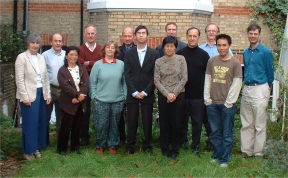
Programme
- John Thompson: Evening
Melodies for the Silk String Zither; Jiu Kuang* - see below
- Charlie Huang: Gao Shan*
- Dan Nung Ing: Ping Sha Luo Yan#
- Christopher Evans: Jiu Kuang^
- Julian Joseph: Ping Sha Luo
Yan^
- Marnix Wells: Guanshan
Yue*
* Played on a qin made
by Wang Peng with
silk strings
# Played on a Qing Dynasty qin ca. 200 years old with
silk strings
^ Played on a qin made
by Zeng Chengwei with
steel/nylon strings
Introduction
We were pleased to welcome qin researcher
and player John Thompson from New York.
Evening Melodies for the Silk String Zither
A qin recital by John
Thompson
The following pieces were to be played at an evening recital in a
church later in the week as part of the Tartu Early Music Festival.
All have a theme related to evening. Although it was not evening in
London when John played these pieces for us... it was late evening in
China, which was perhaps more to the point!
Each title links to more detailed information about the piece on John's
web site, from which much of what follows is quoted or adapted.
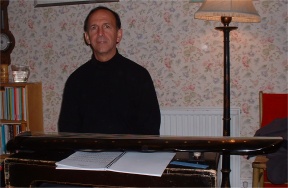
- Guanghan Qiu (Autumn in a Lunar
Palace) (Shenqi Mipu,
1425)
Guanghan (broad, cold)
refers to the moon. The original preface says: "During the clear autumn
season, nights are
cool and people are tranquil; the heavens are vast and bright, the moon
ascends gloriously, and the moon [goddess] is beautiful. A pure
fragrance spreads throughout the universe, and red cassias seem to
float around in the Heavens. This piece has the joy of wandering
to and fro while doing what one wants. How could a commonplace person
achieve or understand this? So these interests are best expressed on
the qin. Only people who eat
the wind and drink the dew can attain
this".
- Tian Feng Huan Pei (Jade Pendants
in a Heavenly Breeze) (Shenqi Mipu,
1425)
The original preface says: "
The predisposition of this piece is like a white moon on a pleasantly
cool evening. The clouds are light and few stars can be seen, the
cornelian jade tinkles in the wind, and
there is a lot of jade-like dew. Floating like a spirit wandering in
the heavens, the immortal wanders in the darkened
universe. Some jade clinks and other jade tinkles.
Nobody can be seen, one just hears the sounds of jingling jade, causing
those who hear it to be able to bring up thoughts
of immortals, and ideas of becoming an immortal.
If one is not among spirits and immortals, how can one have knowledge
of this?"
- Wu Ye Ti (Evening Call of the Raven)
(Shenqi Mipu, 1425)
This piece was reconstructed during the 1950's,
and
has since then become a popular part of the modern repertoire. It
concerns a specific event in the 5th century: prince Liu
Yikang was banished from the capital because of a supposed offence
against his brother the king. He and his nephew cried about the
situation. When the king heard about this, he summoned him back to the
capital, causing him great fear. However the evening before he was due
to return to the capital, some women in his household heard a raven
calling. Such a call was considered lucky, and sure enough he was
forgiven and restored to his former rank.
- Feng Ru Song Ge (Song of Wind
through the Pines) (Taigu Yiyin, 1511) - qin song
Taigu Yiyin (1511) says the melody was written by Ji Kang, but
does not identify the source of the lyrics. The lyrics translated below
are
included in Yuefu Shiji, and are said to be by the Tang Dynasty
monk Jiaoran:
In the
Western mountains the pines have sounds in the
setting sun of autumn, 1,000 branches and 10,000 leaves in the wind
sough.
A wonderful
person takes his qin
and
his playing forms a song, creating amongst the pines sounds both brief
and long.
Sounds brief
and long clear my spirit; one need only mention (such melodies as)
Flowing Waves and
Ruined Mounds.
The wonderful
person at night sits under the bright moon, with little discourse plays
clear tones.
The breeze:
how cool; whirling and fluttering, stirring up the cool pine trees, and
night arrives.
At night
before midnight the tune is so long, (moving on the) qin top in
an even
greater hurry as the sound becomes agitated.
What person at
this time would not be thoughtful, with such bitter
feelings and sad notes heard in the guest hall?
John played this first as an instrumental solo, and then sang it with qin
accompaniment.
- Zui Weng Yin (Old Toper's Chant)
(Two versions: Fengxuan Xuanpin, 1539 and Longmu Qinpu, 1571) - qin song
John played the two versions first as instrumental solos, and then sang
them with qin accompaniment. He originally thought the later
version would be
the harder to sing, but found in practice it worked fairly well. Where qin
tablatures have lyrics, he finds there is usually no
indication as to how
the words relate to music. Usually, he assumes one character per
right-hand stroke, and one per left hand pluck or slide. He uses the
rhythms suggested by the fingerings, which in this case is much the
same
for both versions.
- Mei Shao Yue (Moon Atop a Plum Tree)
(Xilutang Qintong, 1549)
This melody survives only in Xilutang Qintong (1549),
which says it was inspired by the reclusive Song dynasty poet Lin Bu
(967-1028). A
lifelong resident of Hangzhou, Lin spent 20 years as a recluse on
Orphan Mountain, an island in Hangzhou's West Lake. He never married,
claiming that he considered plum trees his wife and pet
cranes his children. The preface in Xilutang Qintong
compares the beauty of the
melody to the beauty of a line in Lin Bu's poem "Small Plum Tree in my
Mountain Garden", which has been translated as
follows:
When
everything has faded they alone shine forth, encroaching on the
charms of smaller gardens.
Their scattered
shadows fall lightly on clear water, their subtle scent
pervades the moonlit dusk.
Snowbirds look
again before they land, butterflies would
faint if they but knew.
Thankfully I can
flirt in whispered verse, I don't need a
sounding board or winecup.
- Zui Yu Chang Wan (A Drunken
Fisherman Sings in the Evening) (Xilutang Qintong, 1549)
This early version is musically unrelated to the melody of this
title played today, the first occurrence of which was not until Tianwenge
Qinpu of 1876, which attributes it to the Sichuan qin player Zhang
Kongshan.
- Zhong Qiu Yue (Mid Autumn Moon)
(Songxianguan Qinpu, 1614)
This piece exists only in this one handbook, which contains no
prefaces.
- Qiu Jiang Ye Bo (Autumn River
Night Anchorage) (Songxianguan Qinpu, 1614)
The melodies in Feng Xuan Xuan Pin
are said to be as played by Yan Tianchi, founder of the Yushan School.
Three titles appear in it for the first time. One of these is Qiu
Jiang Ye Bo, which is actually very similar to Yin De (Hidden Virtue) in Shenqi Mipu. According to Yushan
School tradition, Yan Tianchi was playing qin within earshot of of Maple
Bridge and the nearby Chan (Zen) temple bell. Inspired by a poem of the
same title, he extemporised this piece. Yin De exists in several earlier
handbooks but always in the same version, which suggests that people
must have been playing it strictly from scores. John believes Yan Tianchi must have changed it
sufficiently as he played that it became a new piece.
- Liang Xiao Yin (Peaceful Evening
Prelude) (Songxianguan Qinpu, 1614)
Liang Xiao Yin is still in
the active repertoire. This is the earliest occurrence of the piece
under this title.
- Jiu Kuang
(Yang Lun Taigu Yiyin, 1609)
This version has lyrics, an English translation of the first verse of
which is given below. John sang the Chinese and English versions. One
of the reasons he does not think Jiu
Kuang has triple rhythm is that
these lyrics do not seem to fit when triple rhythm is used.
Fleet
worldly matters: I laugh at the
strain. Quiet, sad feelings
are wasted pain.
How to cure
sadness: call for wine! When drunk all day bad manners are
fine.
Each day of my
whole life through, I should drink great pots of brew.
It is such
bliss, to cruise the Land of Booze;
Sober, then
drunk; drunk and wild as I choose.
Once in the
hills I forget big news.
This piece was not played as a part of the evening theme, but to try
out Dan Nung's recently repaired Qing Dynasty qin.
Questions and answers
Q: How do you go about determining rhythm?
A: I look for structures and repeated patterns. It's more
straightforward for songs, where I try to fit the rhythm of the melody
to a possible rhythm of the lyrics. I start by reading through through
the tablature and putting in whole notes, looking for repeating
patterns. These may be variations, as in some passages in Qiu Jiang
Ye Bo. In this piece, pairs of structures, like a question and
answer, are common. It usually ends up fairly "4-square", and then
becomes
more free. Like most Chinese music, qin music is in double
rhythm, but is played in a more free manner.
Q: Did any of these tunes originate from folk songs?
A: It's hard to tell the origin of melodies. The official
position is yes. The Yuefu Shiji is said to be a collection of
old
melodies, and contains many song texts. A common belief about qin
music is that originally, the music used predomionantly right hand
techniques. Guangling San is a very early piece, and it does
use a
lot of right hand techniques and harmonics. But You Lan,
documented
from the 6th century, uses many left hand techniques, so qins
must have
had a smooth playing surface by then.
Q: Do Zhou Dynasty qins show signs of wear where they
were
rubbed by the left hand?
A: I don't know. Bo Lawergren's research has led him to think
that the qin originated from instruments found in 3rd-5th
century
tombs in south China. He has written articles showing how they have
become longer and narrower, and thus more qin-like. These early
qins
had about 10 strings, reducing to 7. However Chinese tradition says
that qins started with 5 strings, and 2 were added later.
Perhaps the qin developed from a 5-stringed northern instrument
which has
not
survived in tombs. The northern soil is said not to be conducive to the
preservation of wooden objects.
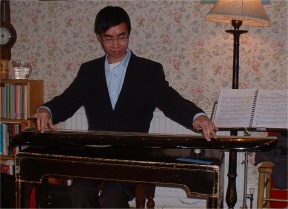
|
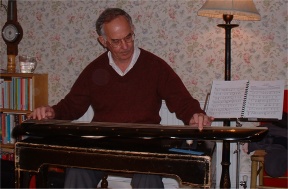
|
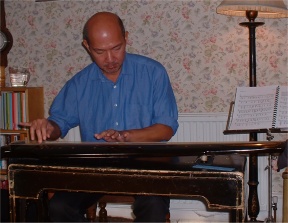
|
Charlie Huang plays Gao Shan
|
Brian Cox
plays Tao Yuan
|
Dan Nung
Ing
plays Ping Sha Luo Yan |
Copyright the London Youlan Qin Society,
2005. All
rights reserved.





